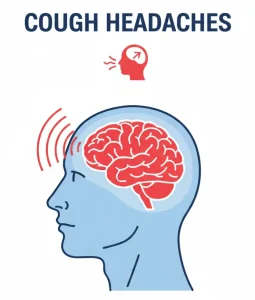Overview
Diagnosis
Your doctor may recommend brain-imaging tests such as MRI or CT scans to rule out other possible causes for your headaches.
Magnetic resonance imaging (MRI) uses a magnetic field and radio waves to create detailed cross-sectional images of the structures within your head. This helps determine whether any abnormalities are causing your cough headache.
Computerized tomography (CT) scans combine X-ray images taken from different angles to produce cross-sectional views of your brain and head. These scans can detect structural issues that may trigger headaches.
In rare cases, a lumbar puncture (spinal tap) may be recommended. During this procedure, a small amount of fluid is removed from around your brain and spinal cord for analysis.
Treatment
Treatment depends on whether the cough headache is primary or secondary.
Primary cough headache
If you have a history of primary cough headaches, your doctor may suggest daily preventive medication to help reduce pain or prevent episodes.
Common medications include:
-
Indomethacin (Indocin), an anti-inflammatory drug
-
Propranolol (Inderal LA), which relaxes blood vessels and lowers blood pressure
-
Acetazolamide, a diuretic that decreases spinal fluid production and reduces pressure inside the skull
Other medications that may be used include methysergide, naproxen sodium (Aleve), methylergonovine, intravenous dihydroergotamine (D.H.E. 45), and phenelzine (Nardil).
Secondary cough headache
If you have a secondary cough headache, surgery is often required to correct the underlying condition. Preventive medications are typically ineffective in these cases. However, a positive response to medication does not always confirm a primary cough headache.
Preparing for your appointment
You may first consult your family doctor or general practitioner. In some cases, you might be referred directly to a neurologist. Being well-prepared can help you make the most of your appointment.
What you can do:
-
Write down any symptoms you are experiencing, even if they seem unrelated.
-
Note important personal details such as past illnesses, surgeries, stress, or recent life changes.
-
Record any accidents or events related to when your cough headache began.
-
List all medications, vitamins, and supplements you take.
-
Bring a family member or friend to help remember details discussed during the visit.
-
Prepare questions to ask your healthcare provider.
Questions to consider asking:
-
What is the most likely cause of my headaches?
-
Are there other possible causes?
-
What tests do I need?
-
How long will these headaches last?
-
What treatment options are available?
-
Are there alternative approaches to treatment?
-
How should I manage my other health conditions alongside this one?
-
Should I see a specialist?
-
Is there a generic version of the prescribed medicine?
-
Are there any educational materials or reliable websites you recommend?
What to expect from your doctor
Your healthcare provider may ask several questions to better understand your condition, such as:
-
When did the headaches begin?
-
Are the headaches continuous or occasional?
-
Have you experienced similar headaches in the past?
-
Have you had other types of headaches? If so, what were they like?
-
Does anyone in your family have migraines or cough headaches?
-
What helps relieve the pain?
-
What seems to make the headaches worse?
Being ready with detailed answers can help your doctor determine the best approach for diagnosis and treatment.
Advertisement

